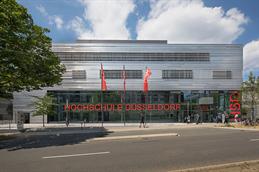Esta web utiliza cookies para que podamos ofrecerte la mejor experiencia de usuario posible. La información de las cookies se almacena en tu navegador y realiza funciones tales como reconocerte cuando vuelves a nuestra web o ayudar a nuestro equipo a comprender qué secciones de la web encuentras más interesantes y útiles.
Seminar: Sustainability at the university - actions for the 17 SDGs
Description
Institution
Organizations/areas of the university involved
Fachbereich Sozial-und Kulturwissenschaften
Country
Germany
In April 2018, the first seminar dedicated to the SDGs started at the Fachbereich Sozial-und Kulturwissenschaften Faculty at the Hochschule Düsseldorf / University of Applied Science (HSD), under the supervision of lecturers Ellen Bannemann and Paloma Orte.
The approach of the seminar is based on the following premises:
– To learn the SDG framework theory is not enough, experimentation and personalization of the message is necessary.
– To work with the SDGs, one must first know their origin and framework.
– Personal experience has an important weight in a methodology that seeks the connection and contact with the essential.
– Each person can, regardless of their condition and experience, work and live the message of the SDGs.
– The university is an adequate space to disclose the SDGs for its commitment to the social, economic and environmental improvement of the planet.
The SDG framework is used because there is an urgent need to provide students, and therefore, society, with instruments and means to implement the 2030 Agenda. All institutions, including academic ones, need the SDGs to elaborate their responsibility and commitment to the global challenges.
The SDG framework was used to structure a course around the teamwork process that requires in each phase a practical learning, where the student acts and reflects in such a way that everything leads to the development of collaborative projects involving students and teachers. The SDG framework was used to emphasize the social responsibility of the HSD for the future and present professional fields of the student body. SDG 17, linked to the construction of alliances and partnerships, works transversally throughout the seminar.
The implementation of the SDGs framework has an organic growth. The seminar lasts 3.5 hours every Wednesday for four months. It takes place in different setting of the HSD: gymnasium, theater, corridors and classrooms.
In a first phase, SDGs are worked on individually, making students experience and live them in their daily life. Subsequently, group dynamics are worked on and, finally, students work concrete and tangible actions related to the SDGs under the banner of “Teams”, aimed to impact groups and communities.
Results and impact measured or expected
The personal work to experience the SDGS in the student’s daily life makes them appreciate them in a positive way. Realistic, measurable, specific and viable actions are established that show both successes and difficulties in accomplishing them. Examples: “only eat organic products for a week”, “only ride a bike, no car”.
Teamwork provides tangible actions that aim to impact the group and the community. Examples: “SDG themed Christmas party “, “Publication of a booklet on” Sustainable consumption”.
A success factor of the seminar is that students design and create their own projects guided by the lecturers, encouraging inter- and transdisciplinary learning. The content and activities are meaningful for all participants through continuous feedback. The combination of presentations triggers critical, constructive and action-oriented discussions.
The result is a seminar with an attractive subject and methodology that will run for the third time in the HSD in April 2019 with 25 students.

Connection with the SDG framework
The seminar has always been far from the more traditional disciplinary approaches and more linked to a pragmatic educational intervention. Therefore, it was not difficult to make a first approach guided by inclusive values and proposals.
The seminar provides students with the skills, knowledge and intrinsic motivation to understand and implement academic and professional solutions around the SDGs while providing collaborative work strategies and partnerships to develop these solutions. The seminar works cross-cutting skills and key competences such as: participation, critical thinking, self-awareness, creativity, commitment, listening, strategic planning, communication, balance, professionalism, feedback culture, rigor and enthusiasm.
Barriers and follow up
At first it was an isolated initiative in the HSD, although later on contact was sought with the government team and the seminar was offered to people from all the Technical University.
There have been difficulties in monitoring, evaluating and studying the actions carried out in the seminar for possible dissemination, due to lack of time. The lack of funding to print brochures, and to have greater means to organize SDGs parties has been solved by the enthusiasm and disinterested collaborations of lecturers and students.
The urgency of accelerating actions to disseminate the SDGs has not reached all educational levels. There are more and more courses on the SDGs but the methodologies for their teaching are very dispersed and are not available to everyone. The lecturers are carrying out an effort in training and monitoring teaching experiences, deciding to define their own experimental thread in the university environment.
Education 4 SDG funciona gracias a WordPress
